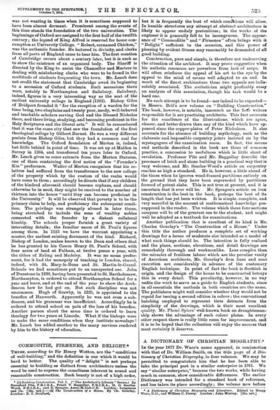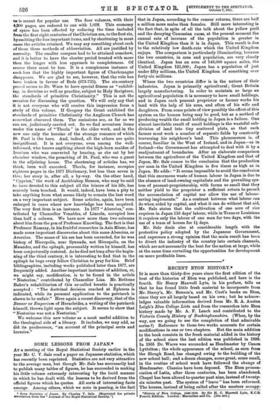A DICTIONARY OF CHRISTIAN BIOGRAPHY.*
IN the year 1877 Dr. Wace's name appeared, in conjunction with that of Dr. William Smith, on the title page of A Die- tionary of Christian Biography, in four volumes. We may be permitted to congratulate him that he has been able to take the principal part in a similar enterprise in 1911. We say " similar enterprise," because the two works, while having much in common, show considerable differences. The earlier Dictionary was intended for a standard book of reference, and has taken its place accordingly ; the volume now before • A Dictionaryof Christian Biography and Literature. Edited by HenryWaco, D.D., and William C. Piercy. London : John Murray. [21s. net
us is meant for popular use. The four volumes, with their 4,200 pages, are reduced to one with 1,028. This economy of space has been effected by reducing the time included from the first eight centuries of the Christian era, to the first six, by om itting the less important items, and by shortening in most cases the articles retained. We may say something about each of these three methods of abbreviation. All are justified by necessity. The smaller compass had to be attained somehow, and it is better to have the shorter period treated with more than the longer with less approach to completeness. Of course there must be loss. It is a conspicuous instance of such loss that the highly important figure of Charlemagne disappears. We are glad to see, however, that the rule has been broken in favour of Bede (673-735). The six-century period seems to Dr. Wace to have special fitness as "exhibit- ing, in doctrine as well as practice, subject to Holy Scripture, the standards of primitive Christianity." This is not the occasion for discussing the question. We will only say that it is not everyone who will receive this impression from a study of this volume. If Gregory the Great exhibited the standards of primitive Christianity the Anglican Church has somewhat obscured them. The omissions are, as far as we can see, judiciously carried out. So we find seventeen items under the name of " Thecla " in the older work, and in the new one only the heroine of the strange romance of which St. Paul is the hero. And, indeed, all the others are quite insignificant. It is not everyone, even among the well- informed, who knows anything about the high-horn maiden of Iconium who was converted by hearing, as she sat by her chamber window, the preaching of St. Paul, who was a guest in the adjoining house. The shortening of articles has, we think, been well executed. Thecla, for instance, occupies eighteen pages in the 1877 Dictionary, but less than seven in this; her story is, after all, a by-way. On the other hand, " Cyprian," the work of Archbishop Benson, who may be said to have devoted to this subject all the leisure of his life, has scarcely been touched. It would, indeed, have been a pity to take anything from what seems likely to remain the last word on a very important subject. Some articles, again, have been enlarged in cases where new knowledge has been acquired. The very first item is an instance. In 1877 "Abercius," con- tributed by Chancellor Venables, of Lincoln, occupied less than half a column. We have now more than two columns about him from the pen of Professor Knowling. The fact is that Professor Ramsay, in his frnitful researches in Asia Minor, has made some important discoveries about this same Abercius, or Avercius. The name of his see has been corrected, for he was bishop of Hieropolis, near Synnada, not Hierapolis, on the Meander, and the epitaph, presumably written by himself, has been conjecturally restored. As he died not long after the begin- ning of the third century, it is interesting to find that in the epitaph he begs every fellow Christian to pray for him. Brief bibliographies, including works published later than 1877, are frequently added. Another important instance of addition, or, we might say, modification, is to be found in the article " Nestorius," contributed by Chancellor Lias. Mr. Bethune Baker's rehabilitation of this so-called heretic is practically accepted : " The doctrinal decision reached at Ephesus is indicated, while its personal application to the patriarch is shown to be unfair." Here again a recent discovery, that of the Bazaar or Emporium of Heracleides, a writing of the patriarch himself, throws light upon the subject. It seems to show that " Ne,storius was not a Nestorian."
We welcome this new volume as a most useful addition to the theological side of a library. It includes, we may add, as did its predecessor, "an account of the principal sects and heresies."































































 Previous page
Previous page